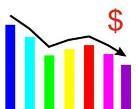June U.S. Total Auto Sales Bleak But There Are Some Bright Spots
 |
DETROIT June 27, 2008; Soyoung Kim writing for Reuters reported that U.S. auto sales in June are expected to post a double-digit decline, dropping to a 15-year low as record gas prices killed the market for trucks and SUVs and made it impossible for many drivers to swap out for more fuel-efficient, new cars.
Major automakers, including Ford Motor Co and General Motors Corp, and leading dealerships have warned that June sales plummeted and shoppers grew suddenly scarce.
Now the urgent question for investors has become whether the world's largest car market has hit bottom or whether an even deeper downturn awaits over the remainder of the year due to $4 per gallon gasoline and tighter credit.
Evidence of a prolonged slump would also add to concerns that Detroit's automakers, saddled with truck-heavy lineups and mounting losses, may not have enough cash to ride out the current tailspin.
"My expectation is that the second half of this year isn't going to be much better, if at all, than the first half," Jerry York, a veteran auto industry executive and adviser to billionaire investor Kirk Kerkorian, told Reuters this week.
GM, Ford and Toyota Motor Corp have responded to a plunge in truck sales by cutting production and adding sale incentives. But Wachovia Capital Markets forecast that despite the moves, inventory of light trucks still rose in June.
Analysts expect June sales to drop more than 10 percent after adjusting for the number of selling days.
Forecasts for the annualized sales rate in June range from 12.5 million units to 13.7 million units, compared with 14.3 million in May. Even at the top end of expectations, sales would mark the worst result for the industry since 1993.
U.S. light vehicle sales dropped 8.4 percent to 6.2 million units in the first five months of 2008, led by a 16 percent decline in sales of trucks and SUVs.
Rising gas prices and a corresponding shift toward more fuel-efficient cars and crossovers have hit U.S. automakers particularly hard.
"There is still uncertainty in the marketplace, and we have no reason to believe gas prices will decrease in the short term," said Jesse Toprak, an analyst at auto industry tracking firm Edmunds.com.
Toprak cut his 2008 sales forecast from 15.5 million units to 14.9 million.
Wall Street analysts now expect U.S. auto sales to be near or below 15 million units this year, down from 16.15 million in 2007. Just six months ago, most had projected only a slight decline in sales this year before a significant recovery in 2009.
But questions about the sales outlook have grown with concern about the near-term risks for the U.S. automakers.
Goldman Sachs downgraded GM to a sell rating on Thursday and warned it would have to raise capital, sending the stock to a 53-year low and prompting selling across the sector.
TRUCK SALE WOES
The collapse in demand for pickup trucks and SUVs has sent their resale value plunging. Prices for used pickup trucks were down 21 percent in May, according to Manheim, a firm that provides auction pricing benchmarks for dealers.
That drop is significant because used car prices are a closely watched barometer for new vehicle sales as a majority of purchases involve a trade-in model and better prices tend to spur more trade-ins.
Many customers, dealers have said, were shut out of the market in June because the trade-in value of their trucks had dropped to less than their remaining loan or lease payments.
Lehman Brothers analyst Brian Johnson said he projects a 10 percent overall decline in U.S. June auto sales and a steeper, 18 percent drop for the Detroit automakers.
GM is expected to post a drop of more than 15 percent in June sales, with Ford sales seen down as much as 17 percent. Sales at Chrysler are expected to be down nearly 23 percent, according to analyst forecasts.
"Chrysler has the most disproportionate exposure to light trucks versus its Detroit-based competitors and therefore will likely experience the most pain from the industry's mix shift," Wachovia Bank said in a research note.
Meanwhile, the rush to smaller cars has helped shelter sales for Japanese automakers, who have more fuel-efficient line-ups than their U.S. rivals.
Sales at Toyota Motor Co, now No. 2 in U.S. auto sales, are seen flat from a year ago. Honda Motor Co is expected to report a 17 percent gain while sales at Nissan Motor Co are seen up 4 percent from a year ago, according to Edmunds.
Editing for Reuters by Gary Hill


